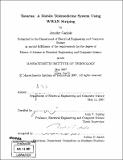Tavarua : a mobile telemedicine system using WWAN striping
Author(s)
Carlisle, Jennifer (Jennifer Nicole)
DownloadFull printable version (4.745Mb)
Other Contributors
Massachusetts Institute of Technology. Dept. of Electrical Engineering and Computer Science.
Advisor
John V. Guttag.
Terms of use
Metadata
Show full item recordAbstract
Tavarua is a platform designed to support mobile telemedicine systems over wireless wide area networks, WWANs. It utilizes network striping and other complementary techniques to send uni-directional near real time video and audio data streams from a imobile node to a stationary location. The key technical challenge is transmitting high-bandwidth, loss-sensitive data over multiple low-bandwidth, lossy channels. We overcome these challenges using dynamic adjustment of the encoding parameters and a novel video encoding technique (grid encoding) that minimizes the impact of packet losses. Using five WWAN interfaces, our system reliably and consistently transmits audio and diagnostic quality video, with median PSNR values that range from 33.716dB to 36.670dB, with near real-time latencies. We present a study of the characteristic behavior of WWANs, and a description of our system architecture based in part on the lessons gleaned from that study. Through a set of experiments where we transmit video and audio data from a moving vehicle we evaluate the system, focusing on consistency, reliability, and the quality of the audio and video streams. These experiments demonstrate that we can transmit high quality video and audio in varying conditions and even in the presence of hardware failures.
Description
Thesis (S.M.)--Massachusetts Institute of Technology, Dept. of Electrical Engineering and Computer Science, 2007. Includes bibliographical references (p. 69-78).
Date issued
2007Department
Massachusetts Institute of Technology. Department of Electrical Engineering and Computer SciencePublisher
Massachusetts Institute of Technology
Keywords
Electrical Engineering and Computer Science.